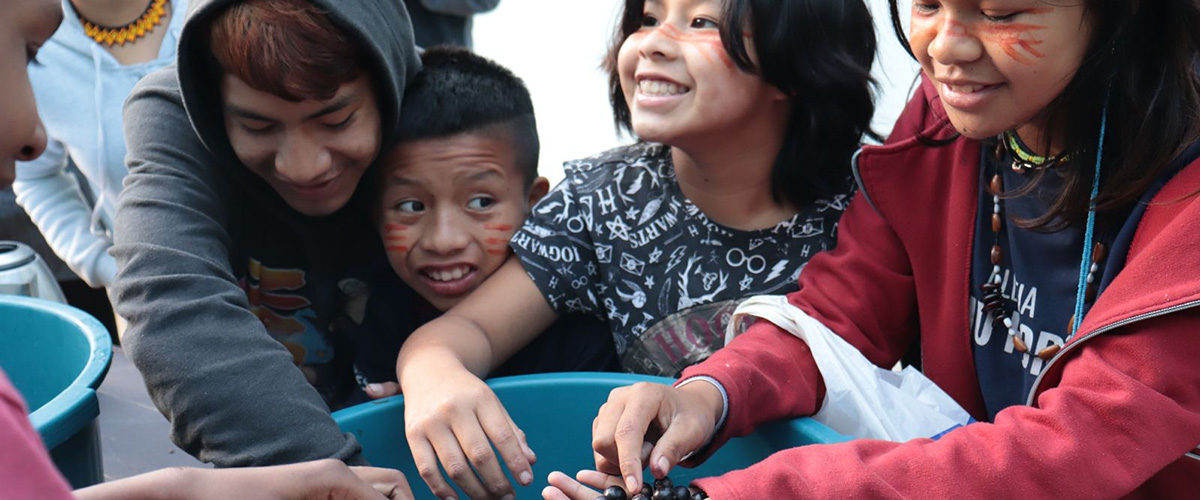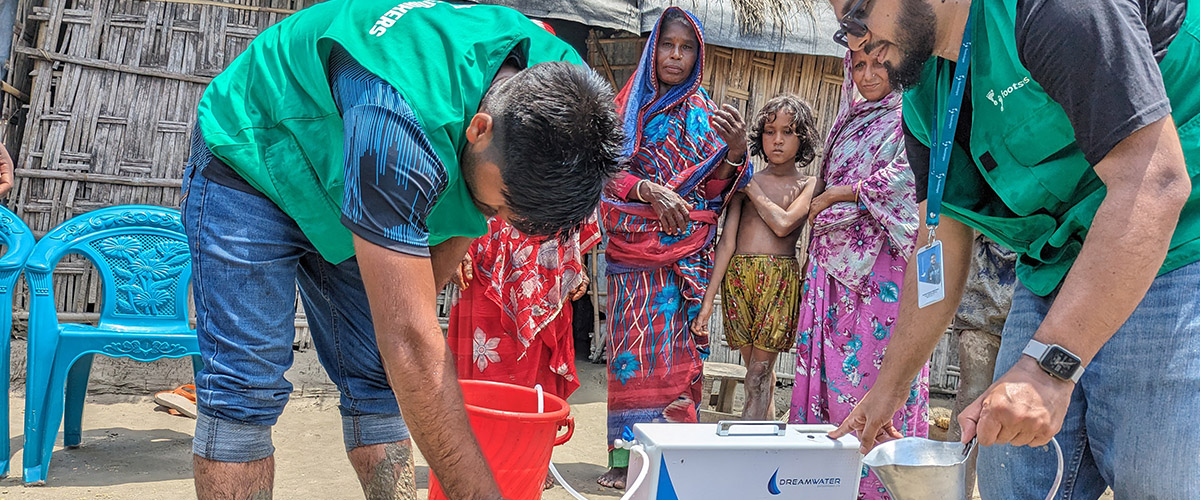
Photo credit: Centro Ecológico, Brazil
The UNDP-implemented AFCIA programme offers substantial support to communities responding to climate stresses in innovative ways. In addition to grant funding, the programme also offers grantees investment brokering, international advocacy, and peer-to-peer knowledge-sharing services. Below is background on the UNDP-AFCIA grant application process and frequently asked questions.
At COP25 in 2019, the Adaptation Fund launched a pilot small grants programme, called the Adaptation Fund Climate Innovation Accelerator (AFCIA), to foster innovation in adaptation in developing countries. The AFCIA programme targets a broad range of potential finance recipients, including governments, non-governmental organizations, community groups, young innovators and other vulnerable groups.
Part of the Adaptation Fund’s Innovation Facility, the programme provides small grants to local actors in developing countries to support innovation for effective, long-term adaptation to climate change.
Initially, two of the Adaptation Fund’s accredited Multilateral Implementing Entities (MIEs) – the United Nations Development Programme (UNDP) and the United Nations Environment Programme (UNEP) – received US$5 million each to run and aggregate a project of small grants (up to US$250,000 each). The Climate Technology Centre and Network (CTCN) – the operational arm of the United Nations Framework Convention on Climate Change (UNFCCC) Technology Mechanism – works in conjunction with UNEP as an executing entity in the AFCIA.
UNDP and UNEP-CTCN provided different services to support innovation in adaptation to developing countries in the AFCIA.
Grant funding (UNDP) has been provided to applicants on a competitive basis. Selected grantees operate and manage their projects by themselves with support from UNDP. Grant funding was open only for not-for-profit entities, including non-governmental organizations (NGOs), civil society organizations (CSOs), business member associations (BMOs), and other associations, cooperatives, or community based organizations registered in a developing country.
Technical assistance (UNEP-CTCN) has been provided to developing countries on a competitive basis. Selected applications have been further developed to design a customized solution tailored to the needs of the developing country, and the solution has been implemented in the country by a technology provider selected by the CTCN. The applications received by the UNDP-CTCN AFCIA programme, had to be signed by the national focal point to the CTCN (National Designated Entity, NDE) and submitted via the programme webpage.
If your country or organization is interested in the UNEP-CTCN AFCIA programme, please access all the relevant information here.
Throughout the implementation of the AFCIA programme, proposals submitted to UNDP-AFCIA were not considered for UNEP-CTCN AFCIA. The rest of the information in this webpage only relates to the UNDP-AFCIA granting process.
The first call for proposals was opened by UNDP in January 2021 (400 applications received), and the second call in September 2022 (500 applications received).
Proposals were received from NGOs and CSOs from Africa, Asia-Pacific, Latin America and the Caribbean, Central Europe, and the Arab States.
The selected grantees from Cohorts 1 and 2 received micro (US$60,000) and small (US$125,000) grants, with an implementation period of 18 months.
Innovative solutions with strong scaling potential from both cohorts will receive a scaling round of funding of US$90,000 - US$125,000 for 12 more months of implementation.
* UNDP-AFCIA won't open a third call for proposals during 2024 or 2025.
General quality criteria: Are the project strategy, objectives, and purpose well defined? Are the logframe indicators and targets are SMART? Do activities and work plans contribute to achieving the project´s goals and outcomes? Are budget estimates clear, realistic, and well-articulated?
Climate change adaptation criteria: Are the project objectives robustly addressing urgent and critical climate change-induced risks? Are the tools/strategies/business solutions in alignment with these risks, demonstrating a clear commitment to climate action?
Innovation criteria: Does the solution/practice/business model demonstrate a unique and promising approach (compared with existing practices/norms)? Is the solution viable and feasible, showing potential for significant impact? Is the solution fostering the creation, testing, deployment, or diffusion of new, adapted, or improved adaptation solutions, developed contextually and with the inclusion of the communities most vulnerable to climate change, thereby inspiring hope for a more resilient future?
- Socio-economic criteria: Are gender mainstreaming and women’s empowerment primary outputs of the project design? Does it have gender-related indicators? Does it enhance the social or economic status of women, Indigenous communities, disadvantaged communities, disabled individuals, young people, or elders? Does the project contribute to reducing poverty, improving food security, improving lifestyles, enhancing governance and empowerment of communities, or Improving the health and safety conditions of the community?
- Environmental criteria: Does it reduce the use of or protect natural resources, promote nature-based solutions, use alternative energy, green technology, green jobs, or any other component of environmental sustainability in the context of climate change adaptation? Does it promote sustainable consumption and production?
- Scaling –up potential criteria: How solid and reasonable are the scaling plans? How sensible, at first glance, do the revenue numbers or the sustainability plans appear, and how reasonable does it seem that the grantees can meet them? With the additional funding, what different position will the project be in after the last funding set?
Community-driven initiatives, known for their cost-effectiveness and adaptability to unique challenges in the Global South, empower communities to build resilience from the grassroots level. The AFCIA programme stands as a groundbreaking innovation accelerator program, igniting and scaling innovative solutions for community resilience in developing countries. It aims to generate evidence of practical solutions that can be scaled up.
In the first round of funding in 2021, UNDP and the partners of the AFCIA programme announced US$2.2 million in climate action grants for 22 local innovators.
Selected proposals varied from advanced aquaculture in India to expanding the production of climate-resilient acai berries in Brazil, reintroducing ancient climate-resilient construction techniques in the Sahel, and creating "blue jobs" in Micronesia. Grants were awarded across 19 countries, including seven from Africa, 11 from Asia, and four from Latin America and the Caribbean. Ten of the 22 were from least developed countries or small island developing states.
"By supporting locally driven climate innovations, these grants enable us to rethink how we support climate-resilient development," said Srilata Kammila, UNDP's Head of Climate Change Adaptation.
The programme unveiled the 22 newly selected organizations in August 2023 and issued an additional US$2.5 million in micro and small grants.
Winning proposals spanned improving food security by introducing and integrating climate-resilient initiatives at a farmer school in Malawi; an innovative insurance solution to mitigate climate risks for smallholder banana farmers in Uganda; a climate-smart farmer model for mulberry silk cultivation in Thailand; dune restoration in Lebanon; and systematization and soil preservation techniques through smooth terraces and collector channels in Argentina.
Of these, 17 have received US$125,000 small grants, and five have received US$60,000 micro-grants, with an implementation window of 16 months. UNDP and strategic partners are providing each local partner with additional technical assistance, investment brokering, tailored support, and international advocacy.
At COP28 in Dubai, the Adaptation Fund announced the expansion of the Adaptation Fund Climate Innovation Accelerator (AFCIA)by welcoming two new partners: the United Nations Industrial Development Organization (UNIDO) and the World Food Programme (WFP).
Under the AFCIA partnership, UNIDO and WFP will administer programmes that will issue small grants and provide technical support globally to local actors, amounting to $20 million. This initiative responds to the alarming gap in international adaptation financing, which falls significantly short of projected needs. See full article here.
Frequently asked questions

Photo credit: Footsteps Bangladesh
Yes. Payments have been made according to an agreed schedule and work plan with the grantee (usually 3 to 4 installments). These payments are released when the project meets at least 70 percent of each pre-agreed milestone. The first disbursement generally carries 30 percent of the total grant amount for the two-year period.
The grant is in US Dollars only.
Specific activities and items that will be funded by UNDP-AFCIA will be determined during the selection process and subject to the grant proposal document agreed upon between the grantee and UNDP. Activities that could potentially generate high- to substantial-risk safeguard impacts are not eligible to be funded by a UNDP-AFCIA grant.
No. UNDP is not involved in the direct implementation of any grant. UNDP provides technical support and orientation for the grantees on how to manage their grants and reports properly. Still, from an oversight perspective, it also includes support to scale up innovative solutions.
Grant recipients are expected to comply with various reporting requirements to be mutually agreed upon during the grant contracting process.
A proportion of the grant budget (approximately 20 percent) should be allocated by each grantee to strengthen the technical capacity of the organization. UNDP and its partners are providing general technical assistance, business development, and investor/donor networking for all grantees. Individual grantees could request technical assistance from UNDP at a case by case basis.
Recipients of grant funding by UNDP-AFCIA are expected to comply with the following requirements:
• Achievements of agreed milestones to trigger payments (at least 70 percent)
• Quarterly progress reports
• Financial statement of expenditures.
• Narrative and financial reporting should come with supporting documentation as annexes.
• Participate in the technical assistance and networking activities provided by the programme
• Provide evidence of concrete efforts to scale or replicate the innovative adaptation solutions and to strengthen the financial sustainability strategies of the organizations.
If a grantee fails to meet an agreed milestone, the programme will halt any subsequent grant releases until a mutually satisfactory solution is found.
No, you will not. However, if fraudulent activities within the grantee organization are identified as the cause of the failure, then UNDP could demand and enforce a full refund of the funds advanced.
Please email us at afcia@undp.org
